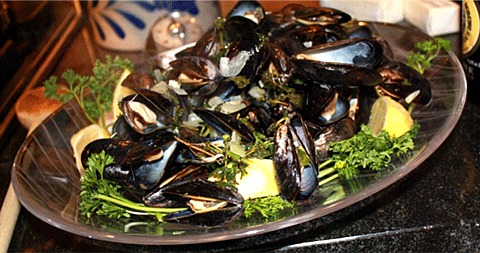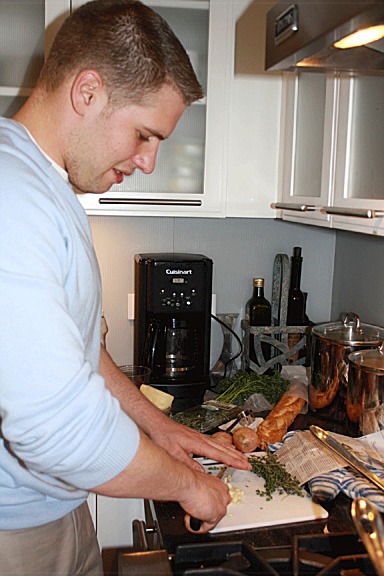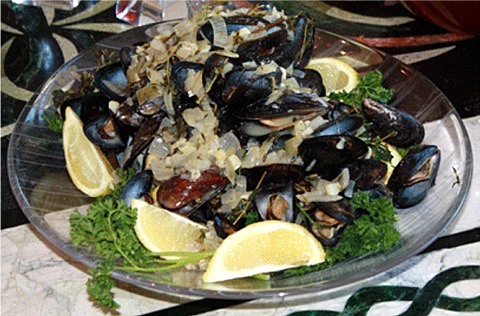
Mussels and photo by Sarah Phillips © Sarah Phillips
My son, Tom, age 23, is a budding chef / cook and has ALWAYS been a foodie! He loves it and yesterday, he was at our apartment, and made a dish of steamed mussels as an appetizer for our Easter meal! It was out-of-this world and we wanted to share it with you! He did this all on his own! I am so proud (which is an understatement!) Tom wants to own a restaurant or two someday, which he has talked about since he was very little! I know he will reach his goal! Tom cooks all the time and everything is delicious and very inventive and creative! ~
TOM SAYS: I recently saw a recipe in the New York Times for steamed ale-mussels which I changed to a specific type of beer, Heifeweisen, which has more bold flavors to compliment the mussels and herbs. Usually you drink a Heifeweisen beer with either a slice of orange or lemon and that is where the idea for mussels came about.
Tom being a recent college grad with his own apartment in New York City, with two roommates, has to watch costs very carefully. In this economic downturn, he was laid off from his regular job of real estate development, and has taken another job at half the income just to get by. He watches every penny! Tom reports that the entire meal cost less than $12.00 for bread, mussels, herbs, lemon, shallots, garlic at Gourmet Garage on 96th and Park, New York City. The beer he selected from his parents' refrigerator, which he called ahead to make sure it was still there for use in his recipe!

Tom photo by Sarah Phillips © Sarah Phillips
INGREDIENTS
2 pounds mussels in shells
2 tablespoons extra-virgin olive oil
4 full sprigs of thyme, chopped in thirds
3 garlic cloves, minced
2 large shallots, chopped
Kosher salt and ground white pepper, to taste
1 cup good beer; TOM SAYS: I used Warsteiner Beer or one that is amber in color, aka a Heifeweise Beer, which is amber/yellow in color
2 to 3 tablespoons finely minced fresh parsley
1 tablespoon lemon juice, optional
1 teaspoon Dijon mustard, preferably spicy brown
3 tablespoons unsalted butter, or more, if needed; can be cold from the refrigerator
Crusty bread, for serving.
Garnish: Finish the recipe with lemon wedges and fresh parsley.
INSTRUCTIONS
1. Place mussels in a large colander and rinse thoroughly under cold running water.
TOM SAYS: If you see hairy clumps around the shell (called beards), use a sharp knife or your fingers to pull them off, then scrub shells well with a vegetable brush. However, cultured mussels will have the beards already removed, whilst wild mussels will most likely still have the beard attached. The beard will have to be removed at home before cooking.
Mussels must be thoroughly cleaned and rinsed several times before cooking. Wild mussels will need to be scrubbed with a stiff brush to remove any barnacles, sand or grit and their beard must also be removed. This can be done by giving the beard a forceful tug with your fingers and pulling it away or by cutting it off with a small and sharp knife. Rinse the wild mussels several times but do not let them sit in water, as freshwater will kill them.
Farmed mussels will have already been prepared for cooking and it will suffice to just give them a quick rinse under a running tap of cold water.
2. In a soup pot with a tight-fitting cover, heat olive oil under medium heat.
Lower the heat to medium-low and then add thyme, garlic, shallots and salt and pepper to taste.
Sauté until garlic and shallots are softened, about 3 minutes.
3. Pour in beer and bring to a simmer under medium-high heat.
Add mussels and cover pot. Let mussels steam, stirring once or twice, until they open, taking only about 5 to 10 minutes. Watch carefully so they do not overcook!
TOM SAYS: The mussels are gently steamed until they open. They need only a few minutes cooking. Over cooked mussels are quite tasteless, rubbery and a bit of a let down.
Use a slotted spoon to immediately transfer mussels to a large serving bowl. Discard any that have not opened.
Retain pan juices in pan.
4. To the pan juices, add the parsley, lemon juice and mustard, and under medium-high heat, and bring it to a boil. Lower heat and whisk in the butter, then taste and correct seasonings (add 1 tablespoon more butter if the liquid tastes bitter).
Pour over mussels and serve immediately with crusty bread for sopping up juices.

Mussels and photo by Sarah Phillips © Sarah Phillips
TOM SAYS:
ABOUT MUSSELS
Buying:
The most important thing to check when buying mussels is that the shells are tightly closed or that they snap shut when tapped with your finger. This means that the mussels are alive and are edible. If the shells are open and do not close, do not buy them. Also try to avoid shells that are broken and mussels that seem too heavy or too light. If when you get home, you notice any open mussels that do not close, it is best to pick them out and discard them immediately.
Storing:
As with all seafood, mussels are best cooked and eaten as soon as possible after purchase. However, mussels will keep for 48 – 72 hours if they are stored properly. At home, rinse the mussels in cold water just to freshen them up slightly and place them in a bowl or on a tray. Do not place them in water under any circumstances, as this will kill them, as will storing them in an airtight container or plastic bag.
Place the mussels in a bowl and cover them with a damp towel or damp kitchen towels and then immediately put them in the refrigerator. They should be kept at a temperature of between 35°F – 40°F, so situate them in the coldest part of your fridge, if possible. Mussels should never ever be frozen when they are still alive, although it is perfectly safe to freeze the mussel meat once it has been cooked.
Nutritionals:
Mussels are a wonderful food with a delicate taste that are high in protein and low in cholesterol and fat. A 3 oz (85 g) portion of cooked blue mussels contains 20g of protein and only 147 calories. It is rich in iron, manganese, phosphorous, selenium, zinc and vitamins C and B12.
Mussels are low in fat, only containing 0,7g of saturated fat in a 3oz portion. They are, however an extremely rich source of Omega-3 fatty acids, which are found in oily fish and other foods but are not produced by the body. The consumption of Omega-3 fatty acids help prevent cardiovascular and heart disease and is an important part of a healthy diet, promoting a healthy brain as well as a healthy body. Mussels in fact contain higher levels of Omega-3 fatty acids than any other shellfish.


